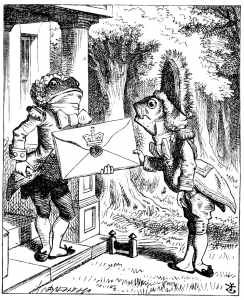The Power of Persuasion and Influence: A Whackadoodle lesson about rapport, and why so many people seem to prefer name calling and pointing fingers to following the second rule of persuasion. If you have entered this story in the middle, click here for the table of contents.
________
I’d been think about how to approach our lesson on persuasion and influence all week, so as soon as she made herself comfortable, I began, “Alright, let’s have a quick review of the persuasion process before we…” I was interrupted by an over-the-top groan. “Did you want to add something?” I asked sweetly.
“Do we really have to review the process again?” She asked giving a huge emphasis to the word again. “You already reviewed the entire sales process in that article you wrote about ‘How to Not Piss Off Your Prospects.’ You remember,” she insisted. “The one about that telemarketer who pissed you off. It was really funny.”
“Yeah,” I recalled, not quite patting myself on the back. “It was a pretty good article.”
“And,” she continued. “Not only was it funny, but the story made it clear how the the process is supposed to work when it’s done right. So I really don’t think we need to review the entire process. I’ll just go back and reread the article.” she finished with a flourish.
“Sure but, there are some new thoughts I wanted to add,” I objected.
“So just add them,” she threw out her arms. “But remember, you promised last week to discuss how to handle people with questionable motives. A lesson that I have been waiting for, and I don’t think we will have have time for both.”
“I remember,” I assured her. “But I really think I have to add something to step two: building rapport.”
“So what did you want to add?” She asked with a touch of impatience. “The definition of rapport?”
“No, no, no,” I assured her. “I just think that I need to point out that too many people have forgotten the rapport step completely, or never learned it in the first place. Instead, they resort to name calling. I mean, I turn on the news and all I hear is name calling, name calling, name calling. I open e-mails, or read articles, and they’re full of name calling. And it’s not just one group doing it. I hear it from all sides.” I shook my head before adding, “Nobody has ever been able to build rapport by name calling.”
“What kind of name calling are you talking about?”
I looked her hard in the eye, then began speaking in an attempt to imitate a popular newscaster, “Those MAGA supporters are just willing idiots. They act like members of a cult, practically worshipping their leader, when they’re really just the stupid pawns of a Fascist criminal. It’s like they don’t know how to think critically. Why can’t they see that they’re being led by a wanna be autocrat who cares nothing about them or our democracy? His followers nothing but haters and losers, a bunch of lunatics who want to take over the asylum.” I continued in my normal voice, “Not much rapport building in those statements, is there?”
“Well,” she hesitated. “They might be building rapport with people who agree with them.”
“True, but are they building any rapport with those who don’t agree with them?”
“I guess not.”
“Now try this one,” I said, and began imitating a different newscaster. “The woke masses are working to destroy our society, and indoctrinate our children with their unchristian values. They’re elite anarchists who want to defame our heroes, and rewrite our history. They’re invading our country, and letting rapist and murders onto our streets. They defend pederasts while persecuting their political rivals. We must fight like hell to protect our precious democracy from the the radical liberals and their immoral beliefs.” I looked at her expectantly.
“I guess there is not much rapport building there either,” she conceded.
“Did I make my point?” I asked.
“Yes. But,” she answered slowly, as if searching for the right words. “If all that name calling doesn’t persuade, why do they do it?”
“Which they are you talking about?” I asked.
“Politicians, media outlets, people like that.”
“Oh, that’s easy. It’s because political motives and media motives do not generally include persuasion,” I told her flatly.
She looked confused. “So what are their goals, if it’s not to inform and persuade?”
“Media outlets need to build ratings, and they know that inflammatory language, name calling, and finger pointing are much more entertaining than a persuasive argument. A rollicking good show creates a loyal audience. It’s not true of all of media mind you, but it’s true of a lot of them. I’ll will tell you this though. If you know what a reporter thinks about a topic while they are reporting on it, then you’re probably not listening to strict investigative journalism. You’re also being told how to interpret that journalism. As far as politicians are concerned, they need to engage their base. They need to get out the vote. They need to get donations flowing. Sometimes the best way to do that is to ferment anger, division, outrage, prejudice, fear, even violence. Negative emotions can be extremely motivating and influential, but I would not call them persuasive.”
“Hold on,” she interrupted. “Aren’t persuasion and influence kind of the same?”
“Kind of the same,” I agreed. “But not exactly the same. Influence has a broad scope. Many things influence us; our role models, our upbringing, our religion, our culture, our language, our bank accounts, our reputation, our alma mater, our careers, our peers, you name it. Many things influence us, and many things contribute to our influence on others. However, persuasion is a specific attempt made by one individual or group to influence the minds and actions of another individual or group. Essentially, persuasion is an attempt to change a mind.”
“But don’t politicians need to be able to persuade people to support their bills and stuff?” she insisted.
“The ones who actually get things done have to practice persuasion, but not all successful politicians are also successful at passing laws and building coalitions.”
“Hum,” she murmured. “I guess I can see that.”
“Good.” I stretched a bit before continuing, “So did you still want to talk about how to deal with people with questionable, or insincere motives?”
“Of course,” she replied immediately. “I’ve been waiting all week.”
“It’s a good thing that you’re learning how to wait,” I teased, “because confronting deception takes a lot of tenacity, preparation, strategy, and most of all patience. You can’t rush the process.”
“Sure, yeah,” she mumbled, digging into her backpack. She produced a pen and a notebook, turned to a blank page, and looked up at me expectantly.
I couldn’t help but laugh at the look on her face. “Tell you what, why don’t we take a little break before beginning? I need to visit the ladies.”
“I suppose if I’ve waited a week, I can wait ten minutes more,” she complained.
I laughed again. “I promise not to take that long, so keep your pen out.”
*********
Navigating a Whackadoodle World: Episode Fourteen, Part Two
The Power of Persuasion and Influence
********
If you would like to have me email you our next episode once it’s gets posted, please join our mailing list.
_________
If you you enjoyed this post, please leave a comment below. It helps our algorithm.
It would also be great if you shared this post. It also helps our algorithm.
If you would like to join Lynn’s mailing list, or ask a Dear Navigator question click here

You can reach Lynn Marie Sager at
DearNavigator@gmail.com
Author:
- Navigating Life in a Whackadoodle World
- Finding Sense in a Whackadoodle World
- Teaching Logic in a Whackadoodle World
- Navigating Life Through Turbulent Tides
- A River Worth Riding: Fourteen Rules for Navigating Life


I have to confess, I’m guilty. I keep referring to Rump supporters as traitors who support a fascist dictator. There, I did it again
I think we are all guilty of it at times. Not usually a problem when we’re with like minded people. We just need to remember that it doesn’t help us persuade.:-)